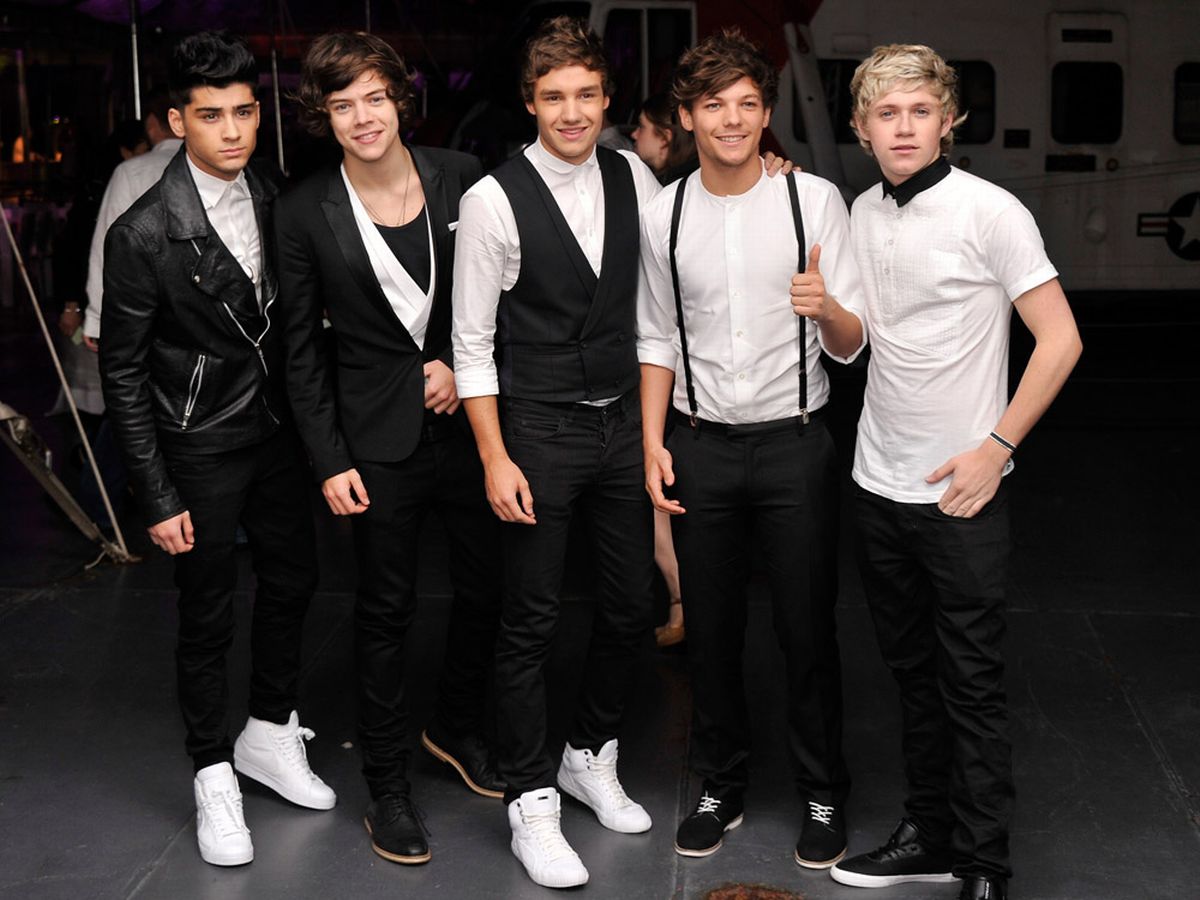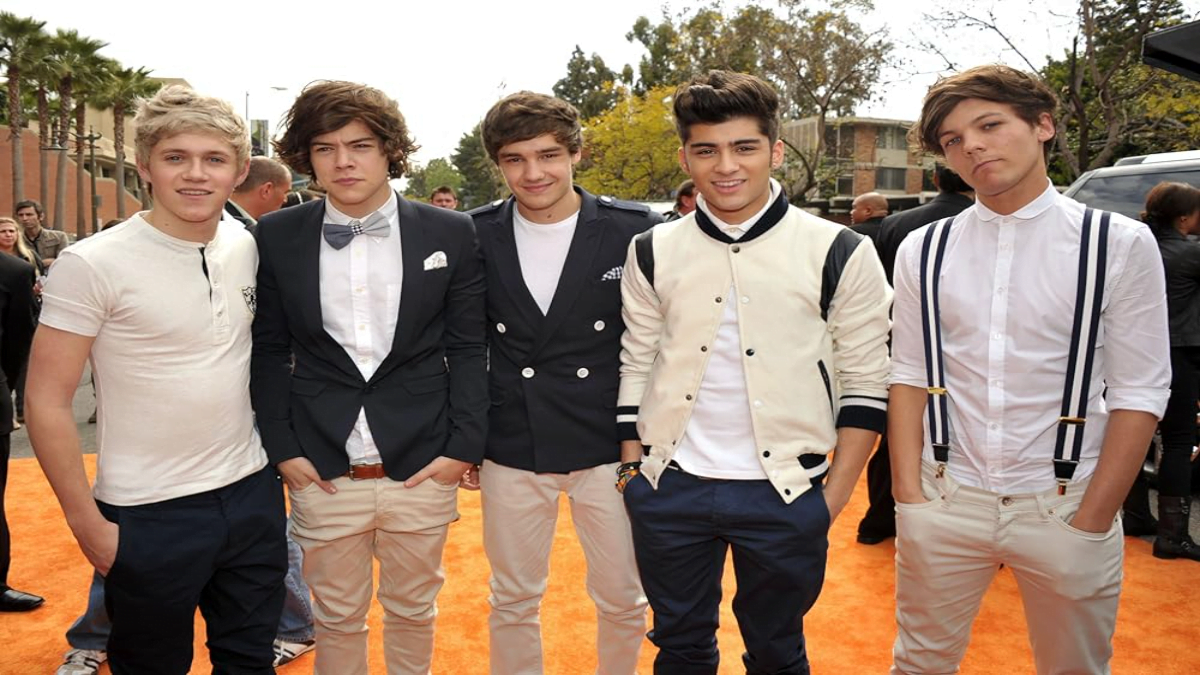As each decade has its own defining all-male musical group that famously sends teenage girls around the world into a frenzy, the year 2010 marked the beginning of yet another boy band sensation that took the girl world by storm. As a five-member group of charming young British boys, right from the start, One Direction was consistently marketed by their management and represented in the media as a heterosexual teen girl heartthrob. In the band’s pursuits to create music for straight girls, they began writing words that these young teens were desperate and longing to hear from their male love interests or crushes at school.
One Direction was consistently marketed by their management and represented in the media as a heterosexual teen girl heartthrob.
Compared to pop music at the time, One Direction’s lyrics were highly sanitised and respectful, considering the age of its target group, depicting a deep love or infatuation with their female subjects without ever objectifying them. Surely enough, these songs became beloved amongst the generation, but little did they know that their writing style would open up their listenership to an entirely unanticipated demographic of girls who found an uncanny connection with the music, especially in its early years.
The band’s formation coinciding with the emergence of the digital platform Tumblr offered young queer girls the opportunity to anonymously express their readings of One Direction music, which gained significant reach in the fandom. Due to the widespread, prolific nature that the lesbian One Direction fandom grew to have, the lesbian subcultural interpretations of the music circulated on Tumblr went so far as to reshape the fandom’s inference of the band writ large.
These young, typically closeted gay women seemed to truly feel what 1D’s lyrics conveyed. Where straight girls loved the music because it became something to aspire to, gay girls loved it because it became something they could relate to. They envisioned themselves as the narrator of the song rather than the sought-after subject, and retrospectively, it seems as though, in essence, the straight girl’s fantasy of a boy is actually just a lesbian girl.
‘Truly, madly deeply’: the emotional intensity of One Direction songs
There were certain recurring themes and tones in One Direction’s oeuvre that were able to portray a young queer person’s experience with a surprising level of depth and nuance, considering that that was not the intention of the music at all. For one, the sheer dedication with which they pined over their love interests alone was enough for lesbians to see themselves reflected in the lyrics. In fact, 1D fandoms on Tumblr frequently posted images that combined One Direction’s lyrics with visuals extracted from other media featuring queer women.
These posts were instrumental in demonstrating the true potential of lesbian narratives that the boyband enabled. Around the same time that David Guetta released ‘Sexy B*tch’, One Direction sang, ‘And then I see you on the street/in his arms, I get weak/My body fails, I’m on my knees/praying.’ To put it simply, the gay girls that listened to these lyrics in 2012 are the same ones that listen to Hozier now, which is to say that every emotion they experience in romance is at its maximum capacity—love and heartache alike.
‘Up in my head I’m your boyfriend’: One Direction songs and boyfriend envy
Then, there is another, more striking theme appearing in a range of One Direction songs that lends itself wonderfully to Sapphic interpretations as it captures emotions that are practically a rite of passage in a young lesbian story. The continuous referencing to the subject’s boyfriend, or sometimes simply an unnamed ‘he/him’, adopts an envious and yet incredibly self-righteous tone to the narrator’s voice.
The continuous referencing to the subject’s boyfriend, or sometimes simply an unnamed ‘he/him’, adopts an envious and yet incredibly self-righteous tone to the narrator’s voice.
As the singer yearns over a love interest that is already in a relationship, they confidently, and at times even cockily, claim to love the subject far more than her boyfriend does, making them more deserving of her love. In ‘Loved You First‘, the lyrics whine over missing their chance with a great girl who now has a boyfriend: ‘Girl, it should be me driving to your house/knocking on your door, kissing you on the mouth.’
A common experience among younger lesbians, particularly before becoming conscious of their own sexuality, is a sense of confidence that they could be a better romantic partner to a specific female friend or peer compared to the current boyfriends of that friend. This sentiment persists even after becoming aware of their sexual orientation, at which point the internal dialogue may extend to a more assertive stance: ‘I should be the one you’re dating.’
As One Direction songs consistently reintroduced the external boyfriend character in several different songs, lesbians found an all-too-familiar connection in their narrative and tone. The song ‘I Would’ has been used time and again to illustrate this very connection, and on one occasion, it was placed over Hailey Kiyoko’s ‘Girls Like Girls’ music video, which shows a teenage girl whose female love interest has a boyfriend. The chorus of ‘I Would’ asks self-assuredly, ‘Would he say he’s in L – O – V – E?/Well, if it was me, then I would.’
‘Are we friends or are we more?’: platonic intimacy In One Direction songs
In a similar light, while the female subject usually tended to have a boyfriend working against the singer’s interests, the singer also seemed to be treading blurry lines between love and friendship with said subject. In the band’s sophomore album Take Me Home, the eighth track ‘Change My Mind’ addresses what appears to be a close friend of the singer and asks sincerely, ‘Never felt like this before/Are we friends or are we more?’
In the album, ‘Last First Kiss’ follows a similar pattern: ‘We’ve been friends now for a while/Wanna know that when you smile, is it me? Are you thinking of me?’. The song goes on to express doubts and fears regarding the subject’s response to their confession, as the singer worries that they will ruin the existing friendship. While confusion and doubts may emerge before any confession of love (regardless of sexuality), they are heightened tenfold when unfolding in a queer dynamic. The queer ‘will-they-won’t-they’ friendships pose a bigger risk when it comes to shame and humiliation, making the fears highlighted in these songs all the more palpable for One Direction’s young lesbian listeners.
‘They don’t know about the things we do’: closets and secrecy
Even when the songs establish that the singer and subject are in a relationship or at least have some kind of romantic connection, the dynamic seems to be something to be kept secret or be in denial about. ‘Little White Lies’ depicts the ‘push-pull’ of a hidden romance in which their partner seems to be going back and forth about their involvement with one another. This partner claims to be a ‘good girl’, she places restrictions on their dynamic, and yet she continues to be physically intimate with the singer. Some lyrics include: ‘You wanna make some rules now/Cool, then we’ll watch them break tonight’ and ‘I know you feel it too/Let’s stop pretending’. The song that reads, on first glance, as her playing hard to get, actually points toward some level of shame and therefore, denial that she seems to be experiencing, when given a closer look.

There is an almost ‘closeted’ nature within these lyrics that hint at potential ridicule or embarrassment should the relationship go public. ‘Happily’, the eighth track on Midnight Memories, contrives a story where the subject is in a secret relationship with the singer despite having a boyfriend: ‘It’s 4 AM, and I know that you’re with him/I wonder if he knows that I touched your skin.’ In the chorus, however, the beat picks up, and the narrator reveals, ‘I don’t care what people say when we’re together!’. Similarly, in ‘Magic‘, ‘Baby c’mon over/I don’t care if people find out.’
And then there is ‘They Don’t Know About Us,’ perhaps the most lesbian One Direction song to ever exist. The queer subtext seems to come through in every line, but most so in the bridge: ‘They don’t know what we do best/Just between me and you, our little secret/But I wanna tell ‘em…that you’re mine…’
It becomes clear then that in the corridors of mainstream pop, where boy bands and teenage anthems reign supreme, One Direction’s unwitting foray into the uncharted territory of the Sapphic subtext has left an indelible mark.
It becomes clear then that in the corridors of mainstream pop, where boy bands and teenage anthems reign supreme, One Direction’s unwitting foray into the uncharted territory of the Sapphic subtext has left an indelible mark. What began as a calculated move to capture the hearts of heterosexual teenage girls morphed into an unexpected anthem for an entirely unforeseen demographic: young gay women. As the digital age ushered in platforms like Tumblr, a clandestine community of queer fans emerged, decoding lyrics and reshaping the narrative landscape.
One Direction’s music is not merely a recapitulation of teenage yearning or the exploration of unrequited love, but an inadvertent portrayal of the delicate nuances within the lesbian experience. The intersection of friendship and romance, the unspoken fears of societal judgement, and the extended periods of pining represented in their music have made unflinching fans of the band even years after its break up. One Direction, perhaps unwittingly, became more than a soundtrack; they became incidental allies, fostering connection and understanding among a demographic that, in the mainstream, often felt unseen.








